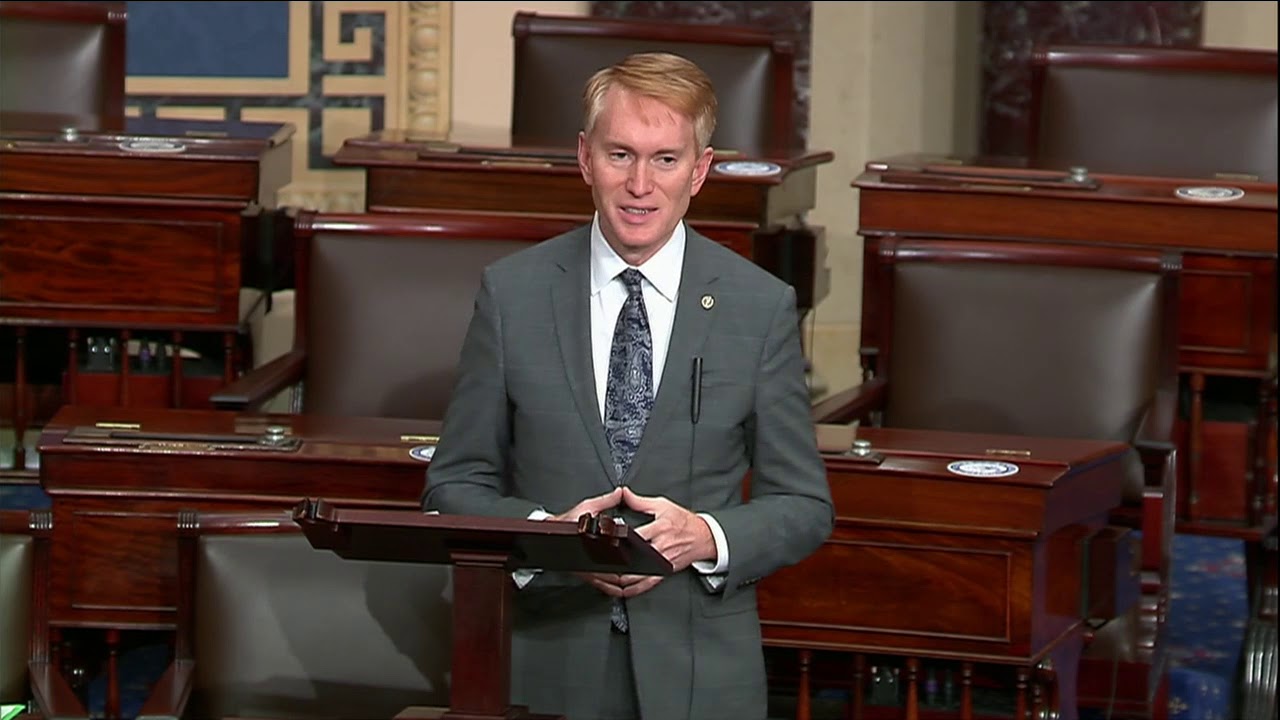Lankford: “The United States has a strong history and commitment to religious freedom, but some throughout the world do not have that privilege.”
WASHINGTON, DC – Senator James Lankford (R-OK) today spoke on the Senate floor to mark the Third Ministerial to Advance Freedom of Religion or Belief, a virtual event this week to which Lankford provided closing remarks today. In his speech, Lankford lauded our nation’s vital protections for the freedom to have and live a faith or have no faith at all and his desire for others around the world to enjoy those same freedoms in addition to the right to life and equal rights under the law for all people.
Lankford continues to work in a bipartisan manner toward the goals of advancing religious liberty at home and abroad. In his ongoing work, Lankford led a bipartisan letter to Secretary of State Pompeo and Ambassador-at-Large for International Religious Freedom Brownback to ask them to consider recommendations made by the US Commission on International Religious Freedom (USCIRF) when determining designations of Countries of Particular Concern (CPC) and placement on the Special Watch List (SWL). Earlier this year, Lankford applauded President Trump’s Executive Order to advance international religious freedom and praised the release of the 2019 International Religious Freedom (IRF) Report. Lankford has also called for the global repeal of blasphemy, heresy, and apostasy laws.
Transcript
In my neighborhood and in my community, you can walk down the street and visit with some really great neighbors. Christians, Jews, Muslims, Hindus, they all live in the same neighborhood. We’re friends. My kids are grown now. We’d watch all our kids were playing together in the community, in the neighborhood and you see just from this one community and just from this one neighborhood, this beautiful thing that our founding fathers dreamed of, the right for every individual to be able to choose a faith of their own decision, to be able to live that faith out, to be able to change that faith if they choose to, or to be able to have no faith at all. There’s plenty of people in my neighborhood, I have no idea what faith they have. They don’t have to post it. They don’t have to print it. They don’t have to say it because they are an American. They don’t have to be a certain faith or to be able to maintain that faith.
That Declaration of Independence makes known that every person has the right to life, liberty, the pursuit of happiness. Our Constitution protects our right to free press, to speak, to assemble, and to petition the government and to have any faith we choose and to be able to live that faith without fear the government [i]s going to impose a faith on them. While our founding documents express these rights, we know inherently these rights should be for all people. As such I think it’s the responsibility of every American not just to cherish the freedoms that we have but to also be able to state those freedoms worldwide and be able to encourage people worldwide to that people should be able to also live these basic human rights and dignities.
The Trump Administration is heavily focused on sharing these ideals with the world. In fact, right now, Poland is advancing freedom of religion and belief. The United States has hosted the first two of those. In fact, I was a participant in the second one, and I was a participant online with the third one that is just in the process. It was implemented with Secretary Pompeo and Ambassador-at-large for Religious Liberty and Freedom, Sam Brownback. It brought people of all faiths together, of all countries together to be able to discuss religion.
This year’s Ministerial definitely looks very different because of COVID worldwide and its restrictions, but it’s remarkable to see foreign ministers from all over the world, many from countries that don’t practice religious liberty, in the middle of a conversation about religious liberty. Eighty percent of the world’s population live where religious freedom is threatened or denied, which puts an extra obligation for those of us that live in freedom to be able to display that freedom to people worldwide. We should condemn religious persecution and work to ensure that all people have the freedom to live their faith, change their faith, or have no faith at all.
In addition to the Ministerial, I’m really encouraged by the growing support of the International Religious Freedom Alliance, which has the membership now of 32 countries. They are dedicated to advancing this basic right of religious freedom. So not only are we seeing people countries gathering in this Ministerial to discuss religious liberty—many from countries that don’t allow religious liberty—but we have 32 countries that are dedicating together to say we do practice religious liberty in our country and we want to spread that.
The Alliance of these 32 countries, which we’re a part of, has two core functions. The first of which is to enhance global advocacy to protect the right of freedom of religious or belief for all and to hold accountable all accountable to those who violate that freedom of religion or belief. And the second thing is to serve as a platform to better coordinate the efforts of governments, parliamentarians, and civil societies to advance this right. I hope this alliance continues to grow, continues to have gaining influence on the world stage. I hope they continue to condemn bad actors who facilitate or condone violence towards people of faith while encouraging leaders to protect their rights of their religious communities and neighbors.
The United States has a strong history and commitment to religious freedom, but some throughout the world do not have that privilege. One-third of the world’s countries have laws that prohibit expression deemed as blasphemous, heretical, apostate, or insulting to religion. Depending on the country, punishment for individuals who participate in this type of expression that they call blasphemy, range from fines to imprisonment to even the death sentence in places like Pakistan. These laws affect Christians, Muslims, Hindus, secularists, all other groups. They scare people into hiding because of their faith. They punish people for changing their faith, and they remove the most basic dignity of the individual, the right to believe. We should continue to expose those that take away that basic human freedom. That’s who we are as Americans. That’s what we stand for worldwide.
The independent, nonpartisan United States Commission on International Religious freedom, they have identified 84 countries that have blasphemy laws on the books. That’s why I joined Senator Coons in cosponsoring the bipartisan resolution to condemn blasphemy and apostasy laws around the world and call for the release of individuals who have been prosecuted or imprisoned for charges of blasphemy. That proposal is ready to go and ready to be passed and has cleared everyone on the Republican side of the aisle and most everyone on the Democratic side of the aisle.
To ensure that religious liberty is a core pillar of our engagement with other countries, the President issued an Executive Order on Advancing International Religious Freedom—the first of its kind. It’s a recommitment to the United States of protecting the freedom to live out your faith regardless of where you live. Under this order, the United States placed a greater prioritization on religious freedom with our foreign assistance programs at the Department of State and with USAID. It is interesting, in addition to religious liberty this Administration partnered with other countries to protect and uphold the sanctity of human life while prioritizing the rights and safety of women worldwide.
Last month, the Administration, along with the governments of Brazil, Egypt, Hungary, Indonesia, and Uganda led a coalition of leaders of more than 30 government leaders representing 1.6 billion people from every part of the planet to sign the Geneva Consensus Declaration. The Declaration reaffirms that all are created equal before the law and that the human rights of women are inalienable, integral, and indivisible parts of human rights and fundamental freedoms. This historic document also strengthens our international commitment to the protection of the most basic human right, the inherent dignity and worth of the human person, that every human being has the right to life. It seems like that would just be a natural thing to say. It seems that that would be apparent that we as a nation and that people around the world would recognize this most basic right of an individual to live. We believe in the right for people to be able to practice whatever faith they choose. We should at least agree before they choose whatever faith they are that they’re allowed to live at all.
This document that was signed on by the United States, Brazil, Egypt, Hungary, Indonesia, and Uganda has this simple statement in it along with multiple others. It says, ‘We reaffirm the inherent dignity of the person that every human being has the inherent right to life and the commitment to enable women to safely go through pregnancy and childbirth and provide couples with the best chance of having a healthy infant.’ I’m proud of this Administration and of 1.6 billion people that are represented by the other governments that have joined into this simple declaration, to protect the rights of women, to stand up for equal rights of those women, and be able to stand up for the rights of every single child.
The historic documents strengthens our international commitment to this basic right. This is a critical tool for the United States and like-minded countries to preserve equal rights for all families for all individuals in every society. It has four pillars: better health for women, preservation of human life, strengthening of the family as the foundational unit of society, and protecting every nation’s national sovereignty in global politics. As I’ve said on this floor before, abortion takes a life. It doesn’t preserve it. It’s not at right. And we, as a nation, should not promote an action to the rest of the world that is antithetical that the most basic of all human rights, the rights to live, to make your own decisions. I’m encouraged that we’re partnered with other like-minded nations, that there are people all over the world that are standing up for the rights for women to be able to have equality, the rights to be able to protect human life, to strengthen families, and the rights to be able to protect national sovereignty. It’s something we should be able to stand up for.
In the days ahead, I pray we continue to stand up for that because every individual should have the right to live and as they live, have the right to be able to have whatever faith they choose to have, to have that faith, live that faith, change that faith, or to have no faith at all. But they don’t even get to choose that if they’re not even allowed to live first. That is something I would hope that we as Americans could also stand for.


